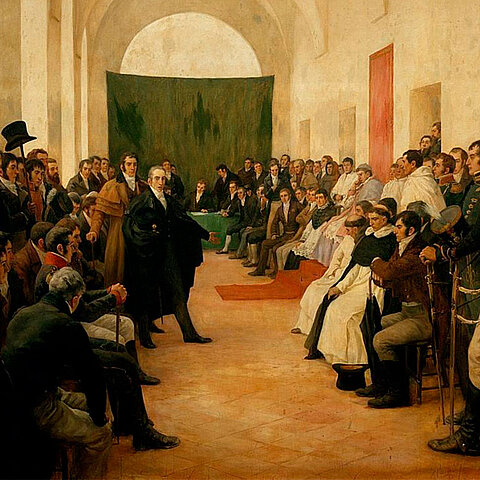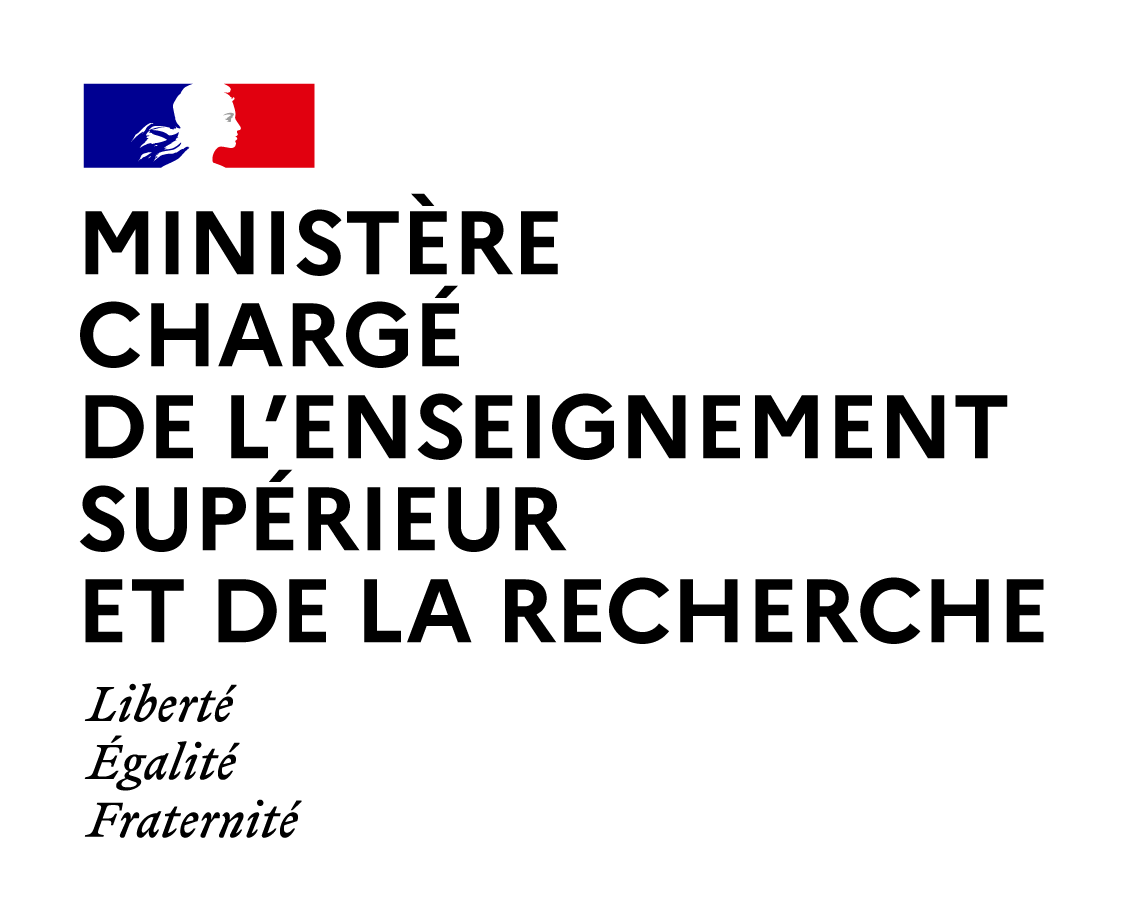Presentation
The political history of the modern period, and that of the 19th century, have long borne the mark of the state as paradigm, one might even say of the inevitability of the advent of the nation-state. However, since the 1980s, numerous works on the history of the law and political ideas in the Atlantic and Mediterranean worlds have largely contributed to the questioning of the categories created by this model, whether it be to think of the government at the heart of the imperial monarchies or the Italian city-states or to describe the very formation of the language of politics. The objective of this summer university, the subject of which calls for a broad chronological framework, is to take stock of these historiographical initiatives for the deconstruction of the State, and to consider their implications. Using renewed methods and techniques, the focus will be on: getting to grips with the forms of government at the levels at which they operate; understanding the types of comprehension that determine the very idea of politics; reflecting on the structure of imperial monarchies and their mode of government, as well the issue of communities and personal status.
The aim of this work would be to form a sort of historiographical and conceptual “tool box” likely to be used in seemingly dissimilar contexts, such as the Reason of States in Italy, the English Revolution or the nations that emerged after Latin-American independence, acknowledging the circulation of concepts, the reflections between them. As a preliminary chronological example, we can recall that the well-known book by Giovani Botero on the Reason of State – 1598 for the final version – was translated that year into Castilian “por mandado del Rey,” that new editions appeared from 1603 in Burgos, or even that his Relationi Universali, books I and IV in particular, is devoted to long analysis of the New World and forms of authority exercised by the Kings of Spain. In general terms, the contexts that we hope to evoke here are fundamentally characterised by the same need to write a history far from the theoretical constructions initiated by Bodin and the teleological narratives on the inexorable progress of the State.
For the Iberian world, the deconstruction of the State constitutes the meeting point of different historiographical approaches. Modern historians such as Pablo Fernández Albaladejo have highlighted the force of the corporate model at work in the Spanish Monarchy, and its longevity in the face of attempts – with little success – to impose an “administrative” monarchy, often assimilated by historiography to an “absolutist” turning point that would have occurred under the aegis of the Bourbons. For their part, historians of the independence period such as François-Xavier Guerra or José Carlos Chiaramonte have questioned the national paradigm as the beginning of the revolutionary disruption, thus helping to reregister the American territories in the imperial framework and thereby increase its intelligibility. Such a change of perspective has fuelled, ahead of the revolutionary rupture, works on the very nature of these imperial monarchies. By emphasising their aggregative and polycentric character, these works have put the traditional divide between the home country and the colonies into perspective and have drawn interesting conclusions on the nature of government. At a later time, historians of the revolutions and the 19th century have also considered the type of system that resulted from the dismantling of the empires, the question of the subject of sovereignty and the Hispanic variants of liberalism and republicanism.
Historians who are part of the critical history of law movement have had a decisive role in this initiative to historiographically deconstruct the State. Bartolomé Clavero and Antonio Hespanha, to name but two, have shown in their work that the government of Iberian monarchies fell under a largely jurisdictional reasoning. Town magistrates, as well as royal officers, served as judges, and their mission included restoring everyone’s rights, in accordance with a Catholic anthropology of harmony and concord. This requirement for “tranquillity” led them to choose from a corpus of extremely heterogeneous norms, those that were best suited to achieve these ends. Subsequently, they “spoke” the law in the full sense of the term, giving oracles on the norms and dispensing sentences, which sums up the “justice of the judges” formula owing to Marta Lorente.
This jurisdictional reading of the government has given political historians and institutions the intellectual tools to challenge the state paradigm wherever it was at work, to question the centralising and absolutist turn of Bourbon reforms and to rethink the nature of the political regimes and the exercise of authority in nations that result from the Atlantic revolutions. The anthropological and conceptual approach specific to the critical history of the law has responded to this type of initiative: the validation of the city (or republic) as a high-profile political subject in the crisis of the Iberian monarchies, as with later political constructions, has attracted historians to the pluralist frameworks of sovereignty and to the strength of the confederal model. The essential role of the cabildos in the exercise of government has been highlighted, as well as the strength of the corporatist and community reasoning, so many elements to which it was possible to give meaning through the jurisdictional paradigm.
In the same way, this paradigm made it possible to comprehensively revise the way in which the principles of liberalism were acclimatised in the Iberian and Italian worlds. Viewing the republic as a body and the government as a jurisdiction thus makes it possible to read political representation as an incarnation of the community and not as mediation, which enhances and enriches the understanding of elements such as the imperative mandate, petitions, assemblies or the pronunciamientos. Taking into account the non-derogation of laws allows, additionally, for constitutionalism to be considered as a consultative or jurisdictional process, far from the meaning conferred by classic liberalism. The orthodox concept of the separation of powers is also challenged, which makes it possible to restore intelligibility to the supposedly illiberal expressions of modernity, which are, amongst others, caudillismo, unanimism, or the regular practice of the extraordinary faculties.
Beyond the question of government, these new historiographical proposals have led researchers to consider the types of societies reigned over by a jurisdictional government. François-Xavier Guerra had earlier stressed that the so-called “modern” principles had taken root in societies that were strongly traditional, corporatist, hierarchical, and entirely structured by religion. If this tradition/modernity partnership was largely criticised and put into perspective, it had the merit of emphasising a problem that would likely be transformed into a research project: which (pluralist) societies were we dealing with in the Iberian monarchies and their imperial extensions before independence, and to what extent were they transformed by the Atlantic revolutions? In other words, what were the principles of cohesion in these communities and how did they reconstruct themselves with regard to the principle of the sovereignty of the people?
Considered from the legal point of view, these questions refer to that of the status of persons and communities, legally defined, and gripped in the complex dynamics of claims, gratuities and the desire for ascension. The republican era, marked by militarisation and the emergence of new political languages, adds complexity to this grammar of bodies and statutes and to the recurrent problem of the government of men. The increase of works on the justice administration during the republican era, at the crossroads of social history and history of the law, clearly capture these issues that were relevant to the administrators at the time, before becoming issues dealt with by historians.
To ask the question of the political bodies and their government in the Atlantic and Mediterranean worlds makes it possible to question afresh the forms of continuity between the modern and contemporary periods and to rethink in its entirety a 19th century rid of its state, even national, coating. A fine understanding of the Iberian case is indeed likely to shed new light on comparable phenomena, but perhaps less identified by historiography, whether it be in France, in Italy or in the English-speaking world.
This is because, all things considered, the same questions run through research today on the formation and the circulation of republicanism in modern Europe, on both sides of a revolutionary cut whose matrix character is strongly contested. Today it would be illusory to want to oppose, by any means and in all contexts, a freedom of the old and a freedom of the modern, a neo-Roman republicanism of virtue and a liberal republicanism of rights which would chronologically follow in succession. On the contrary, examples of conciliation, hybridisation and overlapping are now perfectly observed, as far as in texts by Sidney in particular. These specific experiences, long since moved aside or concealed by the dominant historiography tradition, invite us to reinstate, as in the case of the Iberian universes, questions, procedures, bodies, doctrines, long chronologies: the pursuit of the Common Good or general interest beyond the interests of the State or the Prince; the place of religious aspirations and orders as to how to think of the community or the people; the role bestowed on virtue; the pursuit of ideal forms of representation-incarnation. Here we can mention, for various reasons, works by Quentin Skinner, Philipp Pettit, Rachel Hammersley, Keith Baker and even, on another level, Dale van Kley This is why the comparison with Italy, France, Switzerland and even England is not a concession to an intellectual fashion, but rather a scientific requirement.
Ultimately, the challenge set by this summer university is to hold a dialogue, via classic and Christian republicanism, jurisdictional reasoning of the monarchical government and post-revolutionary republican practices. The Summer School seeks to lay the foundations for a long history of the republican city.
Pedagogical organization of the Summer School
The aims of this Summer School are to bring together a group of researchers, both junior and senior, from different academic backgrounds, and to confront them with the historiographical proposals set out in the above argumentation and to collect their reactions in order to enrich the repertoire of arguments proposed and fields explored.
The Summer School will take place over four days at Casa de Velázquez in Madrid (subject to health conditions in Madrid). In addition to the four organisers, it will mobilise eight guest lecturers and twenty doctoral students selected on the basis of their applications.
The mornings will be structured around the discussion of lectures given by two experienced researchers and devoted to one of the themes of the argument (the historiographical deconstruction of the State, the government of bodies, the question of statutes, the recomposition of communities, etc.). The afternoons will be occupied by thematic workshops where the same researchers and the organizers will lead the discussion on the work of doctoral or post-doctoral students.
Invited lecturers
María Teresa Calderón (to be confirmed)
Universidad Externado de Colombia
Pedro Cardim
Universidade Nova de Lisboa
Marco Geuna (to be confirmed)
Università degli Studi di Milano
Christopher Hamel
Université de Rouen
Jorge Myers
Universidad de Quilmes, Argentine
Beatriz Rojas
Instituto Mora, Mexique
Jean-Frédéric Schaub
EHESS, Paris
Andrea Slemian
Universidade Federal de São Paolo
Conditions
The participation fee is of 50€ per student (via PayPal).
The organization will provide accommodation for the applicants who request it and do not reside in Madrid, as well as lunches. The dinners will be at the expense of the participants, apart from the Final dinner of the Summer School (subject to sanitary conditions).
A maximal support for intercontinental mobility of 300 euros can be granted by Casa de Velázquez to the applicants who request it (using the online form), and who are registered in a university of Africa or Latin-America.
All selected students will also have the possibility to apply for a mobility grant from their home institution and/or from the University of Neuchâtel. Selected applicants can write to the following address for further information: alexandre.frondizi@unine.ch.
The selected students will have to apply for financial assistance from their home institution to cover their travel expenses. The Summer School organization also has a dedicated fund to reimburse, if necessary, all or part of the travel expenses in the case of transcontinental flights for students enrolled in universities in Africa or Latin America, upon budgeted request.
Languages used in the workshop: Spanish, French, English. Students able to express themselves only in English must be able to understand Spanish or French.
HEALTH POLICY: All stays at Casa de Velázquez require proof of a Covid PCR test carried out less than 72 hours prior to arrival.
Applicants
This call for applications is aimed chiefly at PhD students and young researchers.
The 20 participants will be selected on the basis of their academic record, their profile and their knowledge of languages. Priority will be given to the applicants whose research studies fall within the main topics of the workshop. This is why they will be asked to submit a letter explaining the reasons for their application, and sketching the content of the paper they are planning to deliver at the workshop (max. 500 words).
Candidates must register using the online form until Thursday May 13th 2021 (12h/noon, local time in Madrid).















